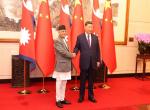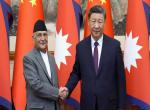The political controversy generated over Prime Minister Manmohan Singh’s participation in the Commonwealth Summit (CHOGM) in Sri Lanka on November 15 deepens mounting concerns about our foreign policy being increasingly determined not by our overall national interest but being driven off course under pressure from some constituent state wracked by narrow regional politics.
Weakness
We tasted this unpleasant phenomenon when Mamata Banerjee’s government obstructed the Teesta accord with Bangladesh, much to the political discomfiture of Sheikh Hasina’s government that had boldly acted to suppress anti-Indian insurgent activity in her country but saw India unable to ink a settlement negotiated with New Delhi. That episode raised questions about the central government exercising its constitutional prerogative to formulate Indian foreign policy without buckling to emotionally charged and ethnically driven regional politics and sentiments.
The Prime Minister’s procrastination about attending CHOGM, the conflicting views of cabinet ministers and the ruling party’s dithering have further exposed the political and institutional weaknesses that have crept into governance. Such decisions, however difficult, should not be postponed to the last minute under visible pressure, as that degrades the government nationally and internationally. The government, already seen as indecisive and lacking in leadership, has inflicted more damage to its image by the confusion over CHOGM. Given the compulsions of coalition politics, it is relatively easier to understand government’s timidity in dealing with domestic political issues unconnected to foreign policy. In such cases, the internal pulls and pressures, and their practical consequences, remain confined within our borders. It is more difficult to understand, however, such governmental vacillation when our external interests are involved.
Generally speaking, functioning, stable countries do not control their external environment to the same degree as the internal one. India has therefore to deal with its external challenges as a nation, not as a political party. For political, economic and security reasons we need to control the play of external powers in our neighbourhood, as we can cause irretrievable damage to our longer-term interest by ill-considered decisions.
Our states have become very sensitive about their constitutional rights and resent any encroachment on them, to the extent of obstructing positive central initiatives such as the creation of a powerful centralized body to combat terrorism which has become a national problem and can worsen, or delaying the implementation of a much-needed tax reform like the GST. By the same token, they should be respectful of constitutional provisions and not interfere in the conduct of the country’s foreign policy by the Centre. It is a well-established constitutional principle that in any federal or even confederate structure, foreign policy, defence and finance are reserved for the central authority.
Regionalism
This does not mean that the Centre, especially in a democracy, should ignore public sentiment, even if it is confined to one part of the country. It must take into consideration the reason, source and strength of such sentiment. In case the Centre is convinced that the country’s larger interest requires a course of action other than that being advocated by a particular section of the public opinion, it has to resort to internal “diplomacy” to explain the rationale of its intended decision to those opposed to it, but not succumb to pressure against its better judgment.
If the power of the Centre to conduct foreign policy gets frayed, India will face enormous difficulties ahead. Our unity will come under strain if states seek to impose their will on the Centre, believing that regional interests are above national interest. With the serious geopolitical challenges India faces, India needs a coherent foreign policy, not one prey to uncertainty created by regional pressures. We will be opening ourselves to greater internal interference by outsiders that will seek to manipulate regional figures and interests to push their objectives. In conformity with international practice, foreign countries are required to conduct their relations with India through the Ministry of External affairs as the political hub. The compulsions of coalition politics in India cannot be allowed to dilute this principle.
The principal political parties in Tamil Nadu must recognize that our relations with Sri Lanka cannot be reduced only to politicking over the Tamil issue there, sensitive and important though it is.
Totality
The Centre has to look at the issue in the wider perspective of the totality of our relations with our geo-politically sensitive neighbour. This has several dimensions, including the need to counter the strategic inroads China is making there at our expense, the coherence of our approach to our neighbours, the functioning of SAARC and the adherence to certain principles of conduct in dealing with sovereign countries that we want to be internationally observed, vis a vis us as well. Other aspects are the expansion of our own economic ties with Sri Lanka as part of a larger policy of developing stronger economic linkages with our neighbours, the prevention of the erosion of our influence over Sri Lanka’s decision making by avoiding any coercive steps and eschewing signals that we might be indirectly supporting the revival of internal dissidence and even terrorism in Sri Lanka by an excessive ethnicity based approach.
This is not to ignore the human rights issue, relief and rehabilitation measures in the war affected zones, the genuine grievances of the Tamil population that remain essentially unaddressed, the signals coming from the latest election results from the provincial elections in the north, the obligation of the Sri Lankan government to implement the 13th Amendment and President Rajapakse’s guile.
If the decision against the Prime Minister attending CHOGM were a well-considered move by the Centre to exert pressure on the Sri Lankan government to address the Tamil issue, it would not be as indefensible as the one now taken to placate Tamil Nadu politicians with electoral calculations in mind.
Published Date: 15th November 2013, Image source: http://secretariat.thecommonwealth.org









Post new comment